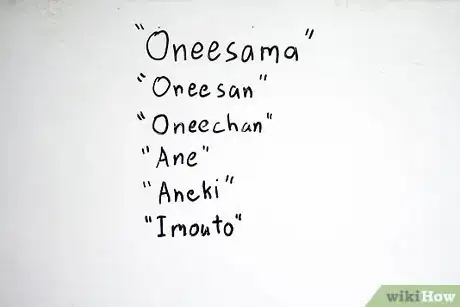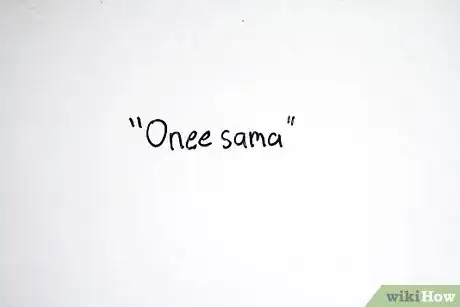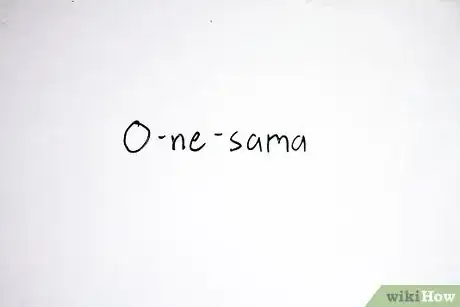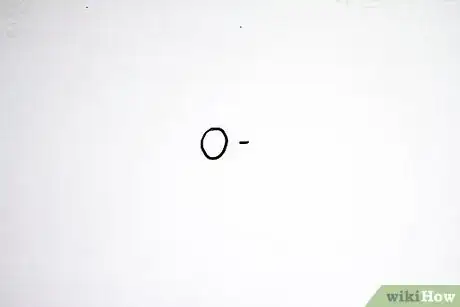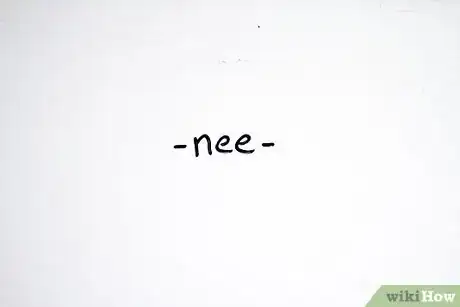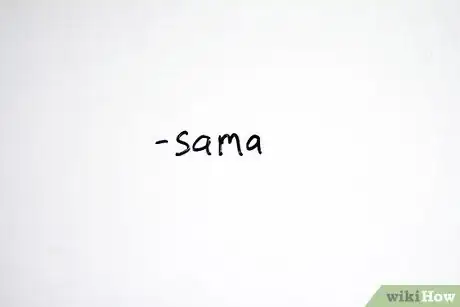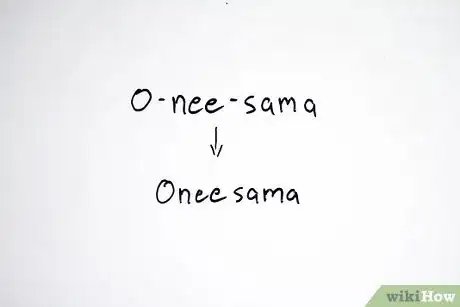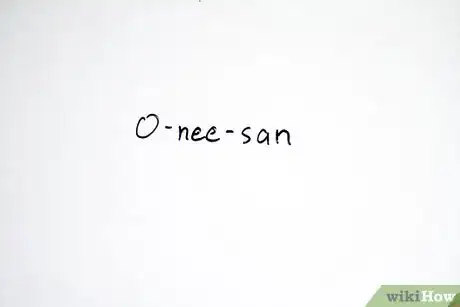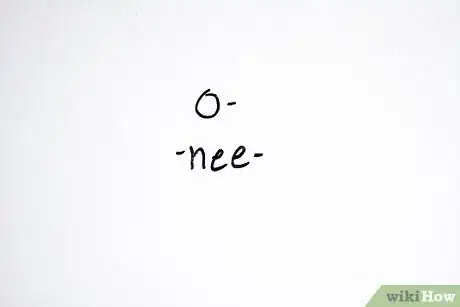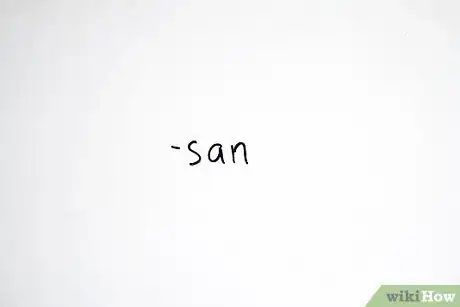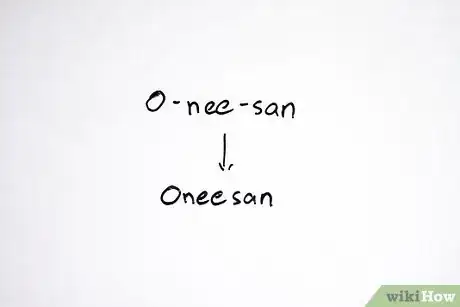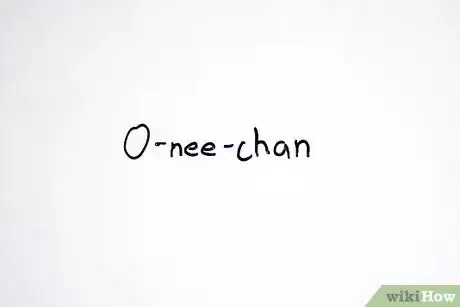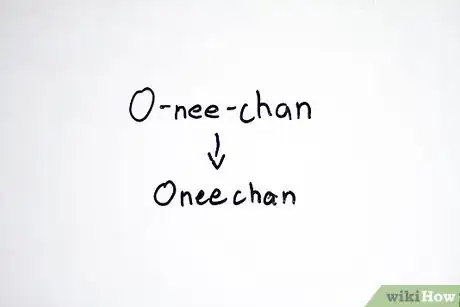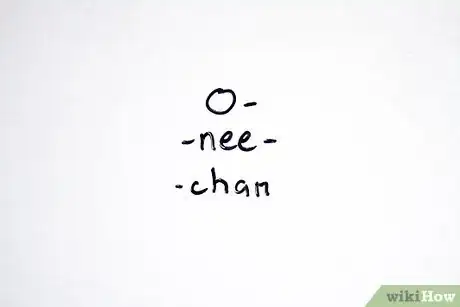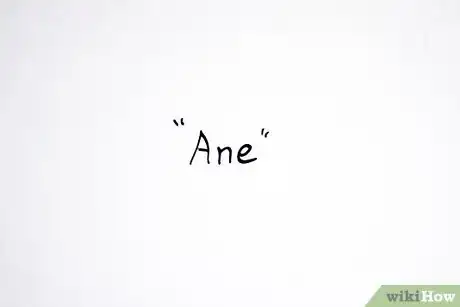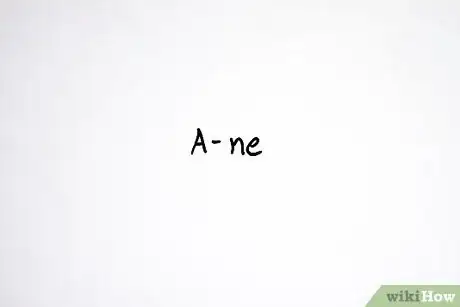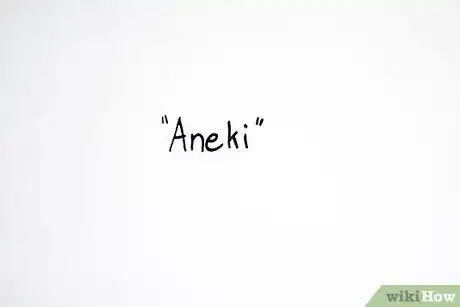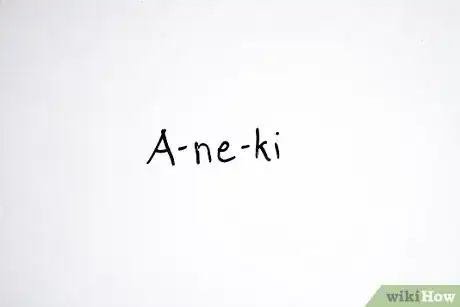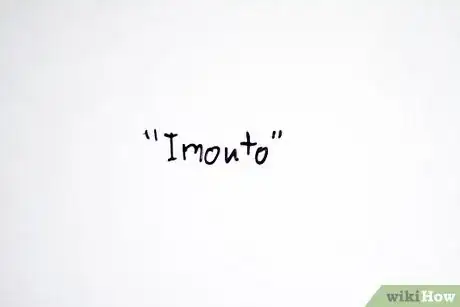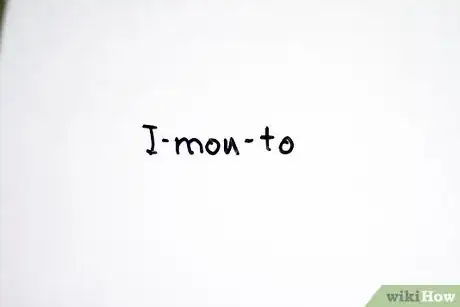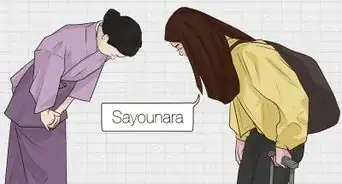X
wikiHow is a “wiki,” similar to Wikipedia, which means that many of our articles are co-written by multiple authors. To create this article, 10 people, some anonymous, worked to edit and improve it over time.
This article has been viewed 252,469 times.
Learn more...
Japanese is a complicated language that can be difficult for English speakers to learn. Pronunciation is difficult, but, if it is broken down, it is easier to tackle. This article will break down pronunciation for each Japanese form of "sister."
Part 1
Part 1 of 6:
Oneesama - Elder Sister (Extremely Polite)
-
1Learn most respectful word for elder sister. It is "oneesama." It translates to "elder sister."[1] However, oneesama isn't really a word you would use on a day-to-day basis. Perhaps if you were apologizing to your sister for a huge offense, in awe of her, or just a super-polite person in all situations, you would use it.
-
2Break it down. There are some elements of the word you might want to consider. In Japanese, honorifics (suffixes that indicate status and respect) are very important. It's best to understand them.
- "O-" This prefix indicates respect. On other forms of sister, it's optional, but if you dropped it from "oneesama," because...
- "-sama" is the most respectful honorific in mainstream Japanese. It emphasizes that the speaker is lower in status than the person they're talking about.[2] In Japanese-to-English translations, this is often translated as "Lord," "Lady," or "Sir." (It is used for either gender.)
- Dropping "o-" while using "-sama" would be something like saying "his Highness, the illustrious buddy of mine."
- "Ne" or "nee" can be found in every Japanese word for "elder sister."
-
3Make "o" sounds like "o" in gopher or oh. However, you need to make it a "pure" o-sound. Notice how in "oh" your voice blurs into a "w" sound. That never happens in Japanese.
-
4"-nee-" is a bit tough. Your first instinct might be to say "knee," but the pronunciation is closer to "neigh." Only "i" makes the long e sound in Japanese. Again, you need to keep a pure "e" sound. Don't let it blur into a "y" sound. Note that "nee" is actually made up of two syllables. This is a difficult thing to pronounce for an English speaker; try clapping for each syllable while saying them slowly to get a sense of it.
-
5"-sama" is simpler. It's probably almost identical to what you pronounced it as in your head. The Japanese "a" is pronounced like the a in "father." Again, don't let it drift into another sound. Keep it short and clipped. "Sa-ma.'
-
6Put it together. Japanese is spoken with minimal inflection, so try not to emphasize any syllable. You should sound monotonous, if anything.
Advertisement
Part 2
Part 2 of 6:
Oneesan & Neesan - Older Sister (Polite)
-
1Break these two down.
- "Oneesan" is more polite, due to the "o-".[3]
- "-san" is respectful. You would use it with people socially equal to you or with someone you don't know very well.
-
2Pronounce "o-" and "-nee-" in the same way described above.
-
3Pronounce the "sa". The "-sa-" in "-san" is pronounced the same as in "-sama". This is one great thing about Japanese: sounds are consistent and don't vary between words, with a few exceptions. The Japanese "n" sounds like the English "n". If anything, it sounds a little like the English "m", depending on the speaker.
-
4Put it together.
Advertisement
Part 3
Part 3 of 6:
Oneechan & Neechan - Big Sis (Casual)
-
1Break it down.
- "-chan" is an honorific used almost exclusively on females. This is a casual, friendly, even endearing honorific that you might use talking to a small child, or a schoolgirl might use for her good friends.[4]
- The respectful "o-" combined with the friendly "-chan" gives the formal a feeling of adoration.
-
2Pronounce the word. The pronunciation is the same as above for "o-", "-nee-", "n", and "a". The "ch" sounds just like it does in English.
-
3Put it together.
Advertisement
Part 4
Part 4 of 6:
Ane - Older Sister
-
1Learn the word for older sister Ane. This word is a bit different. The forms gone over so far are used to address your sister. "Ane" is used when talking about your older sister.[5]
- Note the "-ne-" common to "older sister" words.
-
2Pronunciation is the same as above.
Advertisement
Part 5
Part 5 of 6:
Aneki - Sis (Informal)
-
1Use this form for very casual interactions. It's also slang for a female member of your street gang, but that's another story.
- "Ane" is pronounced as above.
- "ki" sounds like key. Don't drag out the "ey" sound, though. Keep it short, as demonstrated before.
-
2Put it together. Say Aneki.
Advertisement
Part 6
Part 6 of 6:
Imouto - Little Sister
-
1Use "Imouto" as the "little sister" word. Typically, older siblings address younger ones by name, so there's not a big need for "liitle sister" words.[6]
- Don't add honorifics "-chan" or "-kun" to the end. These are only used with "imouto" when you're being rude and condescending to your little sister.
- Add "-san" when talking about someone else's little sister.
- "-ou-" means you double the "o" sound, as before with the "e" sound in "nee."
- "i" and "o" are pronounced as above. The "m" and "t" sound as they do in English.
-
2Put it together.
Advertisement
References
- ↑ https://japanese.fandom.com/wiki/Honorifics
- ↑ https://japanese.fandom.com/wiki/Honorifics
- ↑ https://www.thejapanesepage.com/kanji/%E5%A7%89/
- ↑ https://takelessons.com/blog/japanese-honorifics-z05
- ↑ https://takelessons.com/blog/japanese-vocabulary-family-z05
- ↑ https://www.punipunijapan.com/japanese-family/
About This Article
Advertisement
